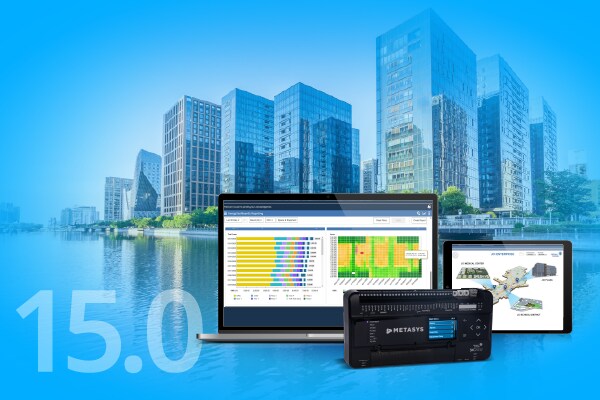How a Building Energy Management System Can Benefit Your Business
In today's world, where sustainability and energy efficiency are key concerns for businesses, implementing a Building Energy Management System (BEMS) has never been more critical. Companies across the country are recognising the need for smarter, more integrated building management system solutions to reduce their carbon footprint, minimise energy costs, and improve operational efficiency. Below, we explore the significant benefits a BEMS can offer to businesses and why it is a game-changer for building management.
What is a Building Energy Management System?
Put simply, a Building Energy Management System (BEMS) is an advanced control system designed to monitor and manage the energy consumption and environmental systems within a building. BEMS, also known as Building Automation Systems (BAS), provides real-time data and automation capabilities that allow businesses to optimise their building’s performance.
By regulating heating, ventilation, air conditioning (HVAC), lighting, and other key systems of building management, it ensures that energy is only used when and where it’s needed, leading to significant cost savings and improved sustainability
BEMS is often confused with Building Management Systems (BMS), but the terms are frequently used interchangeably. While a BMS encompasses broader building controls like security and fire systems, a BEMS focuses specifically on energy management.
Ten Benefits of a Building Energy Management System
- Reduced energy costs
One of the most significant advantages of a Building Energy Management System (BEMS) is the ability to achieve substantial cost savings. By automating the control of energy-intensive systems like HVAC and lighting, a BEMS ensures they operate at peak efficiency. It can reduce energy use during off-peak hours or adjust systems based on occupancy, translating into lower utility bills. Businesses can redirect these savings into other critical areas, optimising their financial performance.
- Improved energy efficiency and sustainability
A BEMS is a crucial tool for businesses striving to meet the UK’s net zero carbon emissions goal by 2050. By identifying inefficiencies and automating adjustments, businesses can reduce their carbon footprint and improve sustainability. It also supports compliance with environmental standards and certifications like BREEAM (Building Research Establishment Environmental Assessment Method), which enhances a company’s reputation and competitive position in the market.
- Enhanced comfort and increased productivity
Employee comfort has a direct link to workplace productivity. Effective building management optimises environmental conditions such as temperature, air quality, and lighting, ensuring they align with occupancy and operational needs. For example, it can adjust a meeting room’s conditions before use, creating a pleasant atmosphere without wasting energy. This attention to comfort boosts employee satisfaction and productivity while fostering a healthier working environment.
- Centralised control and real-time monitoring
Modern BEMS solutions provide centralised control over a building’s energy-consuming systems. Facilities managers can monitor and optimise systems such as HVAC, lighting, and security from a single platform. The real-time data allows for proactive issue resolution, such as identifying a malfunctioning HVAC unit before it escalates, reducing waste and preventing costly repairs.
- Improved asset lifespan
By monitoring and maintaining optimal performance levels, a building management system reduces the strain on equipment such as HVAC units, lighting systems, and other critical assets. Regularly fine-tuning these systems prevents wear and tear, extending their operational lifespan. This reduces the need for frequent replacements and lowers capital expenditure over time.
- Data-driven insights for better decision-making
A BEMS provides detailed analytics and performance metrics, giving businesses valuable insights into their energy usage patterns. These data-driven insights allow facilities managers to identify trends, allocate resources efficiently, and implement building management strategies to further enhance energy performance and sustainability.
- Regulatory compliance and risk reduction
In an era of stringent environmental regulations, a BEMS helps businesses stay compliant with government policies and energy efficiency mandates. It ensures that energy systems adhere to the latest standards, reducing the risk of non-compliance penalties and enhancing corporate responsibility.
- Support for renewable energy integration
BEMS solutions are compatible with renewable energy systems such as solar panels or wind turbines. By effectively managing energy flows and integrating renewable sources, businesses can further reduce their dependency on traditional energy, lowering costs and supporting sustainability goals.
- Enhanced building value and market appeal
Buildings equipped with cutting-edge building management systems are considered more attractive to tenants, investors, and buyers. The improved efficiency, comfort, and sustainability associated with these systems increase the overall value of the property. For property managers and developers, this translates into a competitive edge in the market and higher tenant retention rates.
- Future-proofing your business
As businesses evolve and new technologies emerge, a BEMS offers the scalability to adapt seamlessly. These systems integrate with renewable energy sources, advanced security features, and IoT-based solutions, ensuring your building management remains efficient and innovative. Investing in a BEMS positions businesses for long-term success in a rapidly changing energy landscape.
With these ten benefits, a Building Energy Management System not only delivers immediate operational advantages but also prepares businesses to thrive in a more energy-conscious and sustainable future.
Why Choose Johnson Controls for BEMS Solutions?
When it comes to implementing a Building Energy Management System, choosing the right provider is critical. Johnson Controls are world leaders in BEMS and building management solutions, offering comprehensive and innovative systems that are designed to meet the specific needs of businesses. Our Metasys® system is an industry-leading platform that delivers seamless control and integration of building systems. Metasys® allows businesses to manage energy use efficiently, reduce operational costs, and enhance the comfort and productivity of building occupants.
To learn more about our cutting-edge Metasys® technology or to discuss your building automation requirements with one of our experts, please contact us using the form below.






















.jpg?la=en&h=320&w=720&hash=244C75B74F0F77521D56164450973BCD)














.jpg?la=en&h=310&w=720&hash=8D9823F26AA80B2B75C3E4B2E61770DC)


.jpg?la=en&h=320&w=719&hash=13CA7E4AA3E453809B6726B561F2F4DD)
.jpg?la=en&h=306&w=720&hash=F21A7CD3C49EFBF4D41F00691D09AEAC)

.png?la=en&h=320&w=720&hash=18CFCCD916C92D922F600511FABD775D)



















